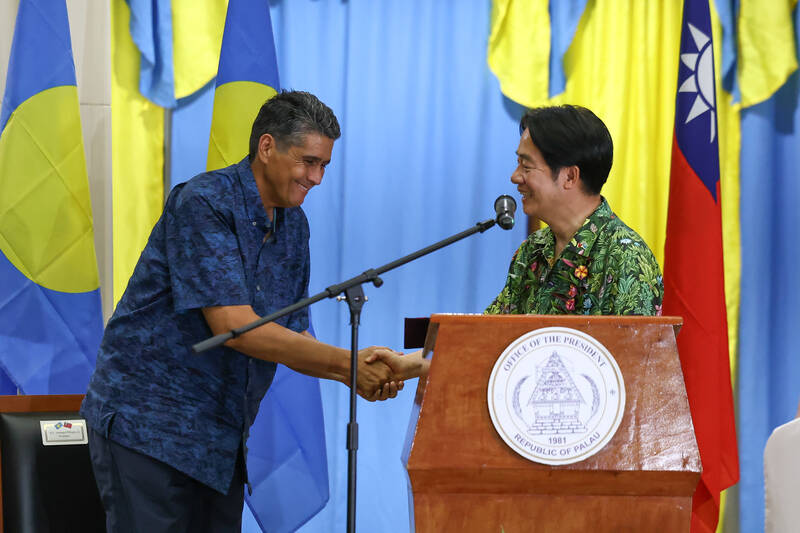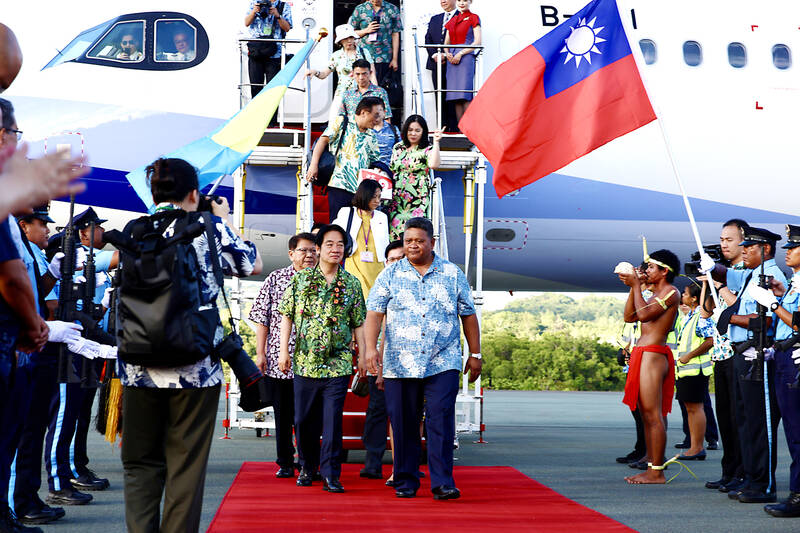President William Lai (賴清德) yesterday told the Palauan National Congress that Taiwan and the Pacific Island nation were “democratic bastions” and should cooperate further to bring prosperity to both countries.
“Taiwan and Palau are both important democratic bastions in the fight against the expansion of authoritarianism,” Lai said, adding that the two nations had championed the values of democracy and freedom.
In addition, Taiwan and Palau, which celebrated the 25th anniversary of formal diplomatic ties this year, have had fruitful exchanges in the areas of climate change response, education, business and tourism, Lai said.

Photo: CNA
The president thanked the Palauan legislature for its longstanding support for Taiwan’s international participation, which had paved the way for his country to contribute to global issues such as public health, climate change, aviation safety and transnational crimes.
He also revealed a new aid project for the Pacific ally, saying that Taiwan would support the Palauan legislature in improving its audiovisual and cybersecurity equipment and installing an electronic voting system.
Lai hoped the project would serve as a “model” for the South Pacific in its pursuit of digital transformation and bring prosperity to the people of both Taiwan and Palau.

Photo: CNA
The address followed a bilateral talk between Lai and Palauan President Surangel Whipps Jr at the latter’s office.
Lai arrived in Palau yesterday afternoon for the last stop of his weeklong South Pacific tour, which also included stops in the US state of Hawaii, the Marshall Islands, Tuvalu and Guam.
Lai, who embarked on his first overseas trip as president on Nov. 30, was to return home this evening.

Taiwanese can file complaints with the Tourism Administration to report travel agencies if their activities caused termination of a person’s citizenship, Mainland Affairs Council Minister Chiu Chui-cheng (邱垂正) said yesterday, after a podcaster highlighted a case in which a person’s citizenship was canceled for receiving a single-use Chinese passport to enter Russia. The council is aware of incidents in which people who signed up through Chinese travel agencies for tours of Russia were told they could obtain Russian visas and fast-track border clearance, Chiu told reporters on the sidelines of an event in Taipei. However, the travel agencies actually applied

Japanese footwear brand Onitsuka Tiger today issued a public apology and said it has suspended an employee amid allegations that the staff member discriminated against a Vietnamese customer at its Taipei 101 store. Posting on the social media platform Threads yesterday, a user said that an employee at the store said that “those shoes are very expensive” when her friend, who is a migrant worker from Vietnam, asked for assistance. The employee then ignored her until she asked again, to which she replied: "We don't have a size 37." The post had amassed nearly 26,000 likes and 916 comments as of this

New measures aimed at making Taiwan more attractive to foreign professionals came into effect this month, the National Development Council said yesterday. Among the changes, international students at Taiwanese universities would be able to work in Taiwan without a work permit in the two years after they graduate, explainer materials provided by the council said. In addition, foreign nationals who graduated from one of the world’s top 200 universities within the past five years can also apply for a two-year open work permit. Previously, those graduates would have needed to apply for a work permit using point-based criteria or have a Taiwanese company

The Shilin District Prosecutors’ Office yesterday indicted two Taiwanese and issued a wanted notice for Pete Liu (劉作虎), founder of Shenzhen-based smartphone manufacturer OnePlus Technology Co (萬普拉斯科技), for allegedly contravening the Act Governing Relations Between the People of the Taiwan Area and the Mainland Area (臺灣地區與大陸地區人民關係條例) by poaching 70 engineers in Taiwan. Liu allegedly traveled to Taiwan at the end of 2014 and met with a Taiwanese man surnamed Lin (林) to discuss establishing a mobile software research and development (R&D) team in Taiwan, prosecutors said. Without approval from the government, Lin, following Liu’s instructions, recruited more than 70 software